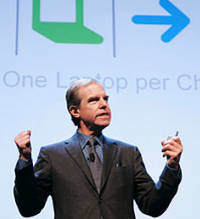Reading Alanna Shaikh's writeup on the OLPC Program as a failure in the UNDispatch and clicking through to Timothy Ogden's harsh commentary, I began to feel a bit defensive for OLPC. I know, it's a bit out of character, but not really.
Perhaps this is because SJ reminded me of some of the core good things that remain part of OLPC during his talk at the OLPC Learning Club / HacDC.org seminar Tuesday night.
SJ went off on tangents on the value of open hardware in society, and the simple concept for learners when they realize that they have complete ownership and ability to open up and modify not only the tools inside the apps on the OLPC laptop, but the code that creates the tools, the code that is the operating system underneath those tools, and the hardware itself that the OS is running on top of.
This is empowering and fundamentally and importantly different from a Microsoft environment, where everything is closed and locked down once you try to step outside the walled gardens.
That is important. I do believe learning should be supported more by open/free software and concepts, and buffered against intellectual property and copyright restrictions.
SJ's stories from Uruguay's CEIBAL project and other Latin American deployments were heart-warming and promising, with "non technical" presentations about making videos (...by using programming tools in Squeak), and a variety of comfort levels with youth toying with the laptops. I left with an overall sense that the OLPC XO is helping expand the hackosphere of people engaged with technology, and not simply being users of technology.
Now, I've had my fair share of problems with the OLPC project from day one. I thought it was bordering on immoral to force countries into buying them in lots of one million, almost guaranteeing a budget disaster and an implementation nightmare, with teachers feeling that the laptops were being forced on them and sitting, covered in dust, in storage rooms.
I think the confusing messaging that's come from OLPC leadership (is it a laptop project or an education project? Does it cost $100? $50? $205? Is it a trojan horse sneaking open source into the classroom in the guise of an ebook?
Is Sugar the best thing since sliced bread or OLPC's biggest mistake?) The list of contradictory comments goes on for a very long time.
At the beginning of 2009, we saw OLPC lay off half of its employees coming after the painful split between Negroponte and Bender in mid-2008. Parallels were drawn to Negroponte's earlier failure with Apple computers in Senegal in the 80s.
I actually think that the problems OLPC is facing is creating a better actual process, as seen in the wider community providing increasingly large support for things like curricula development and technical manuals, and with things like the OLPCorps semi-grassroots projects and the revamped Contributors Program that grants small numbers of laptops to seed community projects.
Projects like these create a groundswell for sustainability, enable the creation and sharing of locally-relevant content, and help reveal real-world constraints in the real cost of the program.
Now, perhaps they should have tried this more natural diffusion process through seed projects and change agents from the beginning, instead of pushing for huge, million-laptops-plus orders. Whether OLPC will host a new G1G1 this holiday season with the new hardware is currently in doubt, and I don't see them dropping education or opening the XO up for base of the pyramid projects or the open market anytime soon, but I feel that we may be at least approaching a key turning-point in the lifespan of OLPC.
Alanna says that "The dream is over" - I think the nightmares are over; the real long-term and more sustainable dream may be just beginning.





I wouldn't suggest trying a new G1G1 program at $399. It will be a failure.
The only solution me and a lot of other people see is that OLPC opens up sales and sells the XO to anyone who wants to buy it. A decent markup for developing world sales (say 50$ would be tolerated and accepted).
When you shoot for the moon, you get a great view and can chart a better course once you land.
Anyone who thought this would be the one true solution is ignorant of history. It's a deployed research project. By that measure, OLPC has been hugely successful. Many technologies have spun off, the industry as a whole has noticed and shifted, and a non-zero number of students have benefited. *Everything* about OLPC was different, from the technology to the commercial structure.
OLPC got off the ground. Y'all got a great view...
@sola : I could not agree more; I've been banging that drum for ... I don't even know how long now. Follow the "open market" link, or the "dropping education" or "base of the pyramid" links for alternate "business plan" ideas for the XO
Releasing the OLPC XO to the wilds of the free market (and reinvesting any profit in extra R&D, grants programs, OLPCCorps support, etc. to maintain nonprofit status) is the key to its long-term survival and wild success.
They're getting closer, though.
@anon
The problem with that model is that you burn a lot of people in the ascent to the moon part who trusted you that it wasn't an experiment, that it was a sure-win. It's a problem in all economic development, where projects and funding follow "hot" trends instead of known, somewhat boring real needs. In the ICT4D world this gets especially bad with the combination of already gadget-happy technologists.
FYI, The other comments on this article, including a rebuttal by Nicholas Negroponte himself, are now working and showing over at UNDispatch : http://www.undispatch.com/node/8859
Community, Jon, and that means listening, sharing, and openness. I agree a lot with your article. Just a couple extra thoughts.
"I actually think that the problems OLPC is facing is creating a better actual process, as seen in the wider community providing increasingly large support for things like curricula development and technical manuals"
We lost most of the largest community ever assembled this side of the Milky Way to support an ICT4E project, a community that was not only cheering for it, but going to the point of putting their money where their mouth is. We lost them basically because OLPC never managed to give them a voice and follow up. So some of the few of us left are still trying, like right now in DC, http://wiki.laptop.org/go/Class_Acts , and hopefully we will not give up, mainly because we feel that the big project and dream is our own project and dream, and maybe because some of us, like yours truly, is just too hardheaded to give up.
Now, we would all feel so much better and be so much more effective for all, for the kids, and especially for OLPC's mission, if OLPC would actually connect with the community, noticing, recognizing and acting with the realization that they still have the "moral leadership" for the integral project, not just the title, a role their executive team seems to have a hard time to rise up to.
"perhaps they should have tried ... through seed projects and change agents from the beginning"
hear, hear
While it is by no means perfect, OLPC is a brave and laudable effort to uplift the poor and oppressed through education. I am very proud to have served as senior systems administrator for OLPC in 2008-2009. I have responded at length to Alanna Shaikh's ill-informed and spiteful comments about the project on my own blog at http://scanlyze.wordpress.com/2009/09/11/nasty-undispatch-blog-attack-on-one-laptop-per-child-a-response/
Henry Edward Hardy
speaking only for myself
Cambridge, MA, USA
@sola, @jon
you spoke my mind.
As a parent, I would any day prefer to buy an XO instead of some glossy crapware from Toys'R'Us.
If students from the developing world can use XO, then what's the point in depriving the students at home?